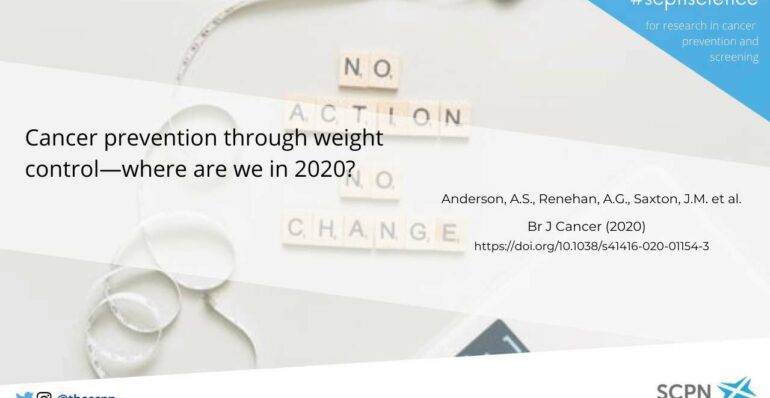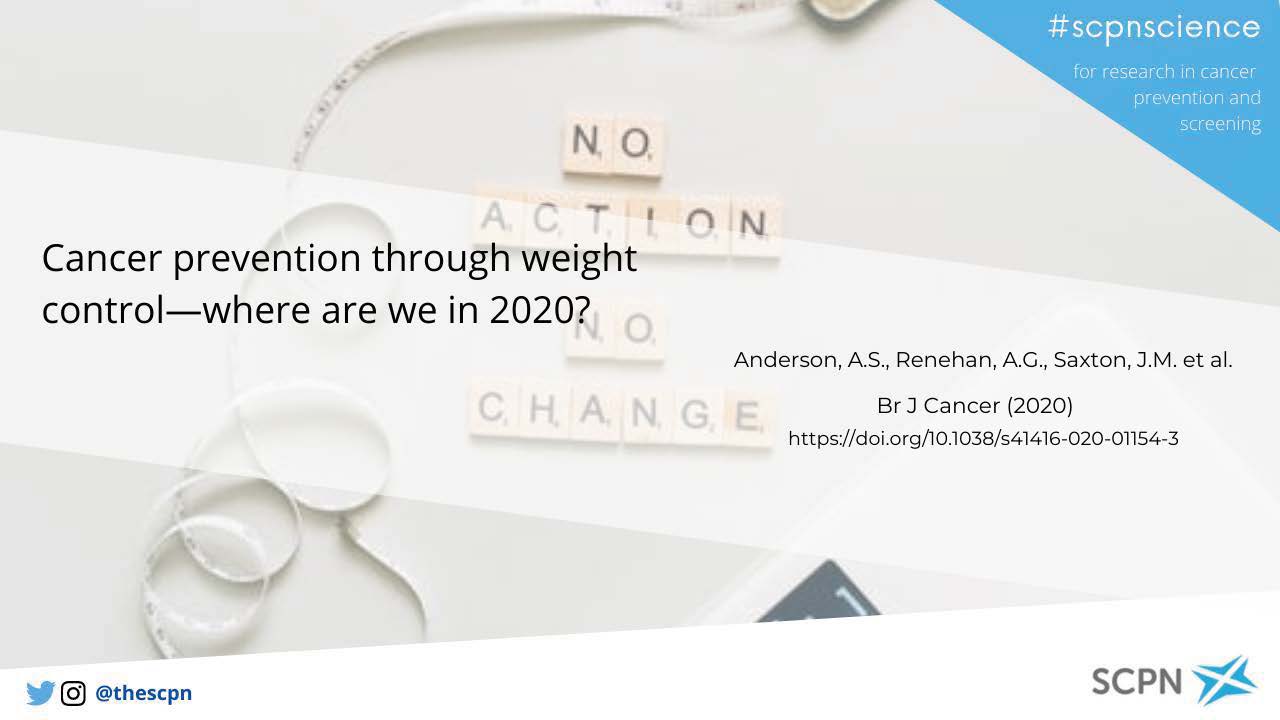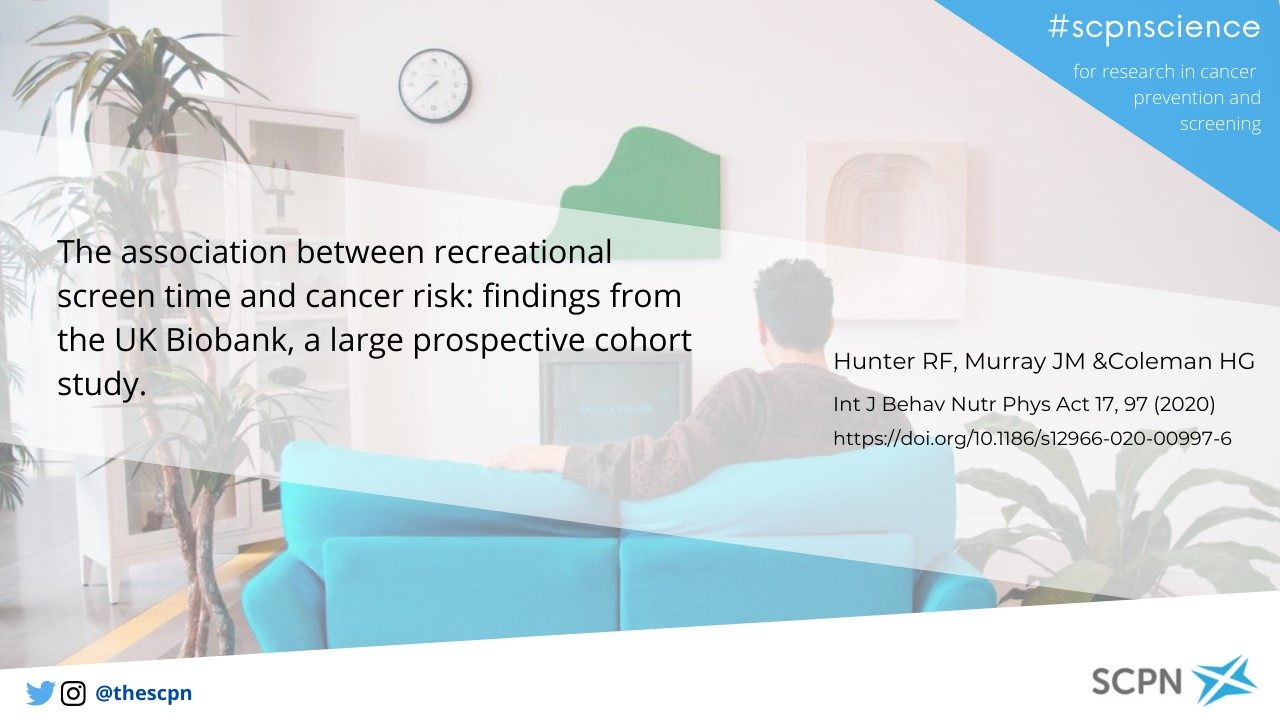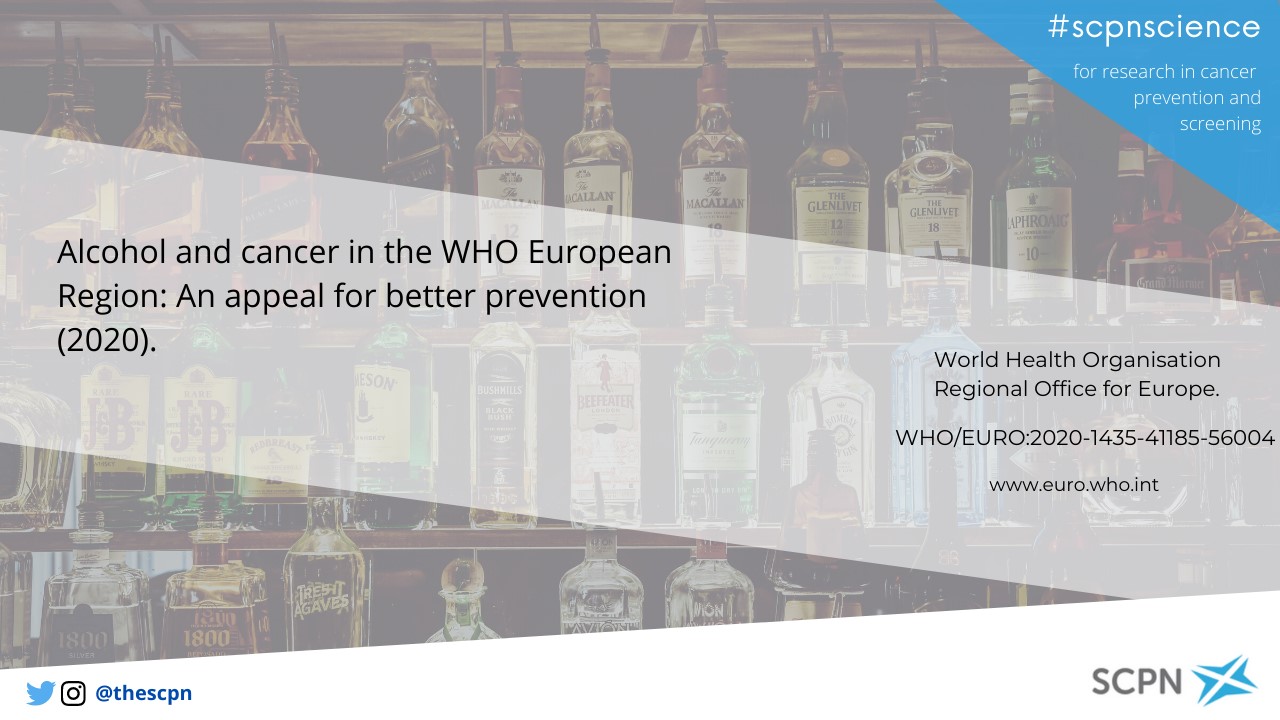
Research Round Up

02 Dec 20 |
There has been some fantastic research published since our last e-digest! Here are some recently published articles we have found interesting at the SCPN.
NIHR Collaboration in Cancer and Nutrition working group on cancer prevention
In 2019 the NIHR Collaboration in Cancer and Nutrition working group on cancer prevention held a satellite research meeting in Dundee supported by The Scottish Cancer Foundation, World Cancer Research Fund and Association for Study of Obesity. Participants heard about national and international research and aspirations for future research on developing non pharmacological approaches for impacting on cancer risk through weight loss and changes in body composition. These outputs from the meeting and further discussions have been published by the British Journal of Cancer as “perspective” papers . They are truly multi-disciplinary in origin drawing together behavioural, clinical, social and medical scientists and make a strong case for why we need to move beyond the epidemiological links between obesity and cancer.

https://www.nature.com/articles/s41416-020-01154-3

https://www.nature.com/articles/s41416-020-01155-2

https://www.thelancet.com/journals/lanonc/article/PIIS1470-2045(20)30398-3/fulltext
The age trial has shown a clinically significant reduction in breast cancer mortality by offering annual screening to women in their 40’s. However, the short screening interval means that the widespread introduction of screening younger women would cause a very significant increase in the costs and workload of breast screening programmes. Not only this, but the number of trained staff needed to make this happen in the UK is just not available at the present time. Realistically, the introduction of screening for women under 40 can only happen when single reading with the help of artificial intelligence prompts takes over from the current practice of double reading. Individualised screening, where, at age 40, women have their risk assessed using family history, genetic variance and mammographic density would also help screening to be focused on those at most risk. Both of these changes are currently experimental but early results are promising.
Comments from co-author Professor Andy Evans, University of Dundee.

https://ijbnpa.biomedcentral.com/articles/10.1186/s12966-020-00997-6
Evidence suggests that sedentary time is associated with increased risk of endometrial cancer. Hunter and colleagues analysed data from the prospective UK Biobank cohort study. Cox proportional hazards models were used to determine associations between daily recreational screen time and site-specific cancer risk. Statistical modelling was used to substitute sedentary time for physical activity. During a mean follow-up of 7.6 years, 28,992 incident cancers were identified among 470,578 adults. Although the majority of observations were small findings show that daily recreational screen time, particularly TV viewing, was associated with small increased risks of oesophago-gastric and colon cancer. Replacing 1-h/day of TV viewing with 1-h of moderate-intensity physical activity or walking was associated with lower risk of oropharyngeal, lung, breast and colorectal cancers.

https://www.euro.who.int/en/health-topics/disease-prevention/alcohol-use/publications/2020/alcohol-and-cancer-in-the-who-european-region-an-appeal-for-better-prevention-2020
Reducing non-communicable disease, including cancer, is one of the main health priorities in Europe, as outlined in the Joint Statement putting prevention at the heart of Europe’s Beating Cancer Plan and WHO’s European Programme of Work, 2020-2025. Globally alcohol is responsible for 3 million deaths every year. Alcohol consumption plays a causal role in serval types of cancer. Awareness of alcohol as a risk factor for cancer is generally low which diminishes wider public support needed for the successful integration of a range of public health policies. This fact sheet provides up-to date information and guidance for those working in this field and it sets out policy options to reduce the alcohol-attributable cancer burden including; increasing excise taxes, enforced bans or comprehensive restrictions on advertising and restrictions on the physical availability of retailed alcohol.
Recent/Ongoing SCPN Research
Living Well after Cancer –Supporting Weight Management
International guidelines on cancer survivorship highlight the importance of weight management (WM) as a priority for people living with and beyond cancer, but support is largely omitted from rehabilitation programmes in Scotland. The SCPN team have recently completed a research study, funded by the Scottish Government, to explore the provision of WM services in the context of cancer survivorship. We conducted 10 focus groups and interviews with people living with and beyond cancer who identified as being overweight or obese. The topic guide explored various themes and was underpinned by the COM-B Model of behaviour. We identified a number of important observations:
- Many Participants were interested in receiving lifestyle advice or WM support but did not feel that they had the capability to engage in WM due to reduced self-efficacy and beliefs in their own physical and mental ability to actively engage in WM (often as a result of treatment side-effects).
- Participants reported limited or ‘non-specific’ WM advice from health care providers and a lack of clear sign-posting to WM services. Those who proactively sought help did so through cancer charities.
- While many did consider a healthy lifestyle as important and were interested in receiving lifestyle advice or WM support. Treatment side-effects, primarily fatigue, led to a lack of motivation which was a key barrier to active engagement.
- Participants were unclear as to how WM services would be best delivered but agreed that support should be Personalised, and service providers should be both knowledgeable and sensitive to cancer specific issues.
Results suggest that there are significant ‘gaps’ in the provision of WM support within the health service. While further work is needed the study highlights an urgent need for the alignment of services to ensure that the appropriate help is available to those seeking WM support.
This study was presented at the NCRI Virtual showcase on 2nd November, 2020:-
A qualitative study exploring weight management support for people living with and beyond cancer in Scotland. The patient perspective.
Karen Barnett, Meena Bhagat, Bob Steele and Annie S Anderson.